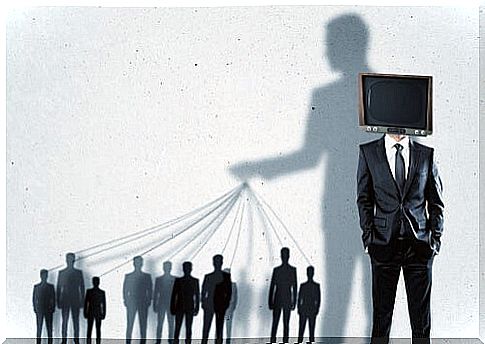What Is The Third Person Effect?

When we speak of the third-person effect, we are referring to the tendency of people to believe that the media have less influence on them than on others. Some authors have explained it as an example of self-defensive attribution bias, as opposed to false consensus bias.
The explanations that have been given for this phenomenon have been psychosocial and based on attribution theories. Delving into the third person effect is interesting not only for attribution theories, but also for understanding the processes of social comparison or intergroup relations. However, research on this topic is barely published in social psychology journals.

Who proposed the term of third person effect?
The term “third person effect” was coined by the sociologist Davison (1983). Davison described it as the tendency of people to believe that the media exerts more influence on other people than on themselves. Those others are not “you” (people who know each other well), but third parties.
This author emphasizes that the importance of this phenomenon lies in the consequences that the expectations of the influence of the media may have on different aspects of public life .
These expectations about others can condition behaviors such as voting: “ as the electoral campaign is being carried out in the media, the majority will vote for that party, then I will adjust my vote to that knowledge that I have on the others ”.
For Davison (1983), the underlying phenomenon is based on “pluralistic ignorance”. The process in people’s minds would be more or less like this: “ Most (third parties) will certainly be brainwashed by the media. They will ignore or not take into account all the data that people like me value when analyzing the messages of the mass media and, therefore, the influence of these on the majority will be great “.
Research on the third person effect
In 2011, Falces et al. Conducted a study in which they presented one of two versions (quality: strong vs. weak) of a health promotion campaign.
Half of the participants were asked to judge the influence on themselves (first person) and the rest the influence on others (third person). Participants estimated the influence of that campaign (specific estimate) and of health promotion campaigns in general (abstract estimate).
The results show that the magnitude of the third person effect increases when the question is abstract and the message is weak. When the question is specific and the message is strong, it is reversed, appearing rsona, that is, when we believe that the message will have more influence on ourselves than on third parties.
The results suggest that the level of abstraction of the estimate may condition the appearance of the third person effect. That is, when we believe that the message will have more influence on ourselves than on third parties
In another study, the third person effect was analyzed from the perspective of the superior conformity of one’s own behavior or the “primus inter pares” effect. It means that the tendency of people to place themselves at higher levels than others in any process of social comparison prevails.
Based on Cialdini’s principles of persuasion, they developed a questionnaire related to messages from an electoral campaign. The questionnaire was answered by 419 young people who were going to vote for the first time in general elections.
They had to esteem themselves and other young people. This comparison varied depending on the experimental condition. The conditions were: young person who votes for the same party, average young person (without clarity of vote), young person who votes for the party they would never vote for.
The results confirmed a “primus inter pares” effect. That is, there is a direct relationship between the influence perceived in themselves and that perceived in others.
The third person effect was significant for all types of messages (based on reciprocity, scarcity, authority, social sanction and sympathy) except for those based on the principle of coherence. Messages based on consistency or coherence are closer to more individual beliefs that make us differentiate ourselves from others, which is why the effect was not produced.

If you have not interested social psychology, who is interested?
In our day to day, we can observe examples related to the third-person effect: fluctuations in the stock market due to news in the press, shortages due to mass purchase of certain products if it is thought that they will be scarce for a period of time, censorship of certain media or programs, etc.
It has surely been this last aspect, that of media censorship, which has generated the interest of communication theorists in the third-person effect. That is why most of the literature on this topic has appeared in publications related to the analysis of the media.
The third-person effect can help explain various aspects of social behavior, including fear of heretical propaganda from religious leaders and fear of dissent from political rulers. There are many ways we can be persuaded; becoming aware of them gives us a small advantage to avoid falling into the trap.









